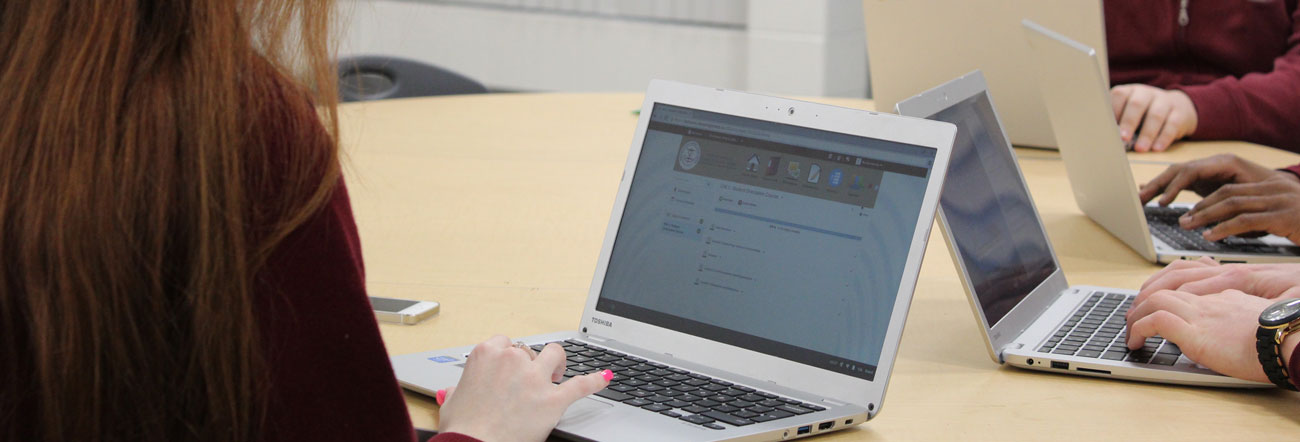
As you are aware, the rate of technological change in the last two decades has been extraordinary. Digital technologies and the Internet have transformed the world into a place where vast amounts of information can be accessed instantly; people around the world are connected; we work in collaboration; and rich media content is created with relative ease.
Our students are digital natives, born into a world of universal access to information. We provide our students with the tools, skills, and knowledge they require to flourish in this new world. We are committed to preparing students to live, learn and contribute ethically in the 21st Century. View our presentation to learn more about our vision for 21st Century Teaching and Learning.
Bring Your Own Device (BYOD)
BYOD allows students to bring electronic devices to school for educational purposes. Students are expected to use devices responsibly, and only with the permission and direction of teachers or other staff members. Research indicates that the use of technology increases engagement, which leads to improved student success. The following are reasons why BYOD works well:
- Students are usually experts in their own device and can customize it to suit their learning needs
- Students can use it to learn anytime, anywhere;
- Students can collaborate and work anytime; before school, after school, and at lunchtime; and
- Student-owned devices are often more up-to-date than those provided by the school due to the cost of replacing hardware for the entire system.
Our students are going to live and work in a world where people use electronic devices regularly. They need to learn how to use devices in a respectful, responsible and ethical manner. The Durham Catholic District School Board’s BYOD procedures, School Codes of Conduct and Ontario Graduate Expectations will guide teachers in the process of teaching students what it means to be good digital citizens.
Not every parent can, or wants to send their child to school with an electronic device. Teachers will continue to plan lessons that do not require the use of a personally owned device. Teachers are encouraged to give advanced notice when they plan to incorporate electronic devices into a lesson. Students without devices will have the opportunity to work collaboratively with other students or borrow a school device.
Students are required to use the Board’s wireless network, which they can access at no cost while at school. They will not be permitted to access their paid data plans while in school. The Durham Catholic District School Board’s network filter will help prevent students from accessing inappropriate web content while they are logged in at school.
Schools will have plans in place to help students keep their devices secures. Ultimately, students are responsible for lost, stolen, and/or damaged personal electronic devices, just as they are for other personal items brought to school.
Permission for Photo and Video Sharing at School
As we try to keep pace with social media that is so much a part of our students’ lives, it is important to be reminded of people’s right to privacy. While taking photos or videos at various school events, please be mindful that it is illegal to post/upload/share photos or videos of anyone other than yourself your child on the internet or anywhere without the expressed consent of the person or their guardian. Sharing photos or videos of others without their consent is a privacy violation.
Acceptable Use of Technology Agreement
- Students will respect the dignity of others and contribute to the common good.
- Students will only use social media in a manner that respects the dignity of others.
- Students will use the internet, computers and personally owned electronic devices in a manner consistent with the Catholic Graduate Expectations.
- Students will respect the intellectual property rights of others and not pirate or plagiarize.
- Students will protect their digital identity, their passwords, and others’ right to privacy online.
- Students will only use personally owned electronic devices (e.g., cell phones, tablets, iPods) during class time when it is allowed by their teacher.
- Students will not take pictures, videos or audio recordings of people without their permission.
- Students will not use an electronic device in private areas (e.g., washrooms, change rooms, and administrative offices).
- Students understand that inappropriate use of personally owned electronic devices make me subject to discipline as noted in the Board’s Acceptable Use of Information and Communication Technology Administrative Procedure, Code of Conduct Policy and Student Discipline Policy.
- Students will remember Jesus’ message do unto others as I would have done to me.
Student Learning Portal - LaunchPad
Our Board is committed to providing 21st century learning skills. Our new learning portal, LaunchPad, provides students with access to board and ministry approved digital resources anywhere and anytime.
LaunchPad provides access to:
- Microsoft Office 365;
- Blended Learning and eLearning courses;
- Homework Help;
- Encyclopedia Britannica Online;
- Bitstrips, BookFlix and much more.
e-Learning
Students can earn Ontario high school credits online through our Board's e-Learning program. Courses meet all curriculum expectations and standards and all courses are taught by fully qualified teachers in collaboration with eLearning Ontario.
An e-Learning course is conducted entirely online using a Learning Management System (LMS). Taking an e-Learning course gives students more flexibility in their timetable and opportunities to earn credits while building valuable independent learning skills that will be beneficial to any post-secondary pathway.
Success in e-Learning courses requires students to be independent and self-motivated learners. E-Learning is not intended to replace face-to-face classes, however, it provides options to students in particular scenarios, such as:
- the need for a flexible timetable due to special circumstances;
- access to courses that are not offered at the student's school; and
- timetable conflicts that cannot be resolved at the student's school.
Interested students can speak to their school's Guidance department to learn more.
